Posted August 8, 2021 by Nicky in Reviews / 2 Comments
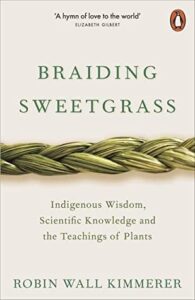 Braiding Sweetgrass: Indigenous Wisdom, Scientific Knowledge, and the Teachings of Plants, Robin Wall Kimmerer
Braiding Sweetgrass: Indigenous Wisdom, Scientific Knowledge, and the Teachings of Plants, Robin Wall Kimmerer
From the reviews and blurbs I read for this, I was expecting something that used scientific knowledge a little more than this. It is there, woven into how the author understands the world… but much of it is autobiography, a memoir of how the author came to understand the world through an amalgam of scientific knowledge and training (she is a botanist) and the teachings of indigenous people. She is Potawatomi herself, though those are not the only traditions she references.
I’m afraid that far from being a spirit-nourishing breath of fresh air, as others have found it, it ultimately struck me as very sentimental. She romanticises indigenous lives and teachings to a huge degree. It’s difficult, because of course much of what she says about the changes colonisation brought to the US is true, and I agree with her about the need to live more constructively with other beings on Earth — I don’t think there’s much I actually disagreed with at all! (I can think of one point: she wants to see ecosystems restored to exactly what they were, while I’m not sure that is always possible or desirable. The clock can’t simply be turned back.)
…And yet, still, I found the whole book very sentimental and a little, I guess, vicariously embarrassing? I’m sure the author would view that to some extent as my poverty of spirit, but on the one hand, I don’t find science so devoid of wonder and warmth as she says, and on the other, I don’t think I need to imbue inanimate objects with innate purpose and souls in order to treat the world with respect.
Admittedly, it also does not help that I don’t share her experiences. Britain has different flora and fauna, obviously, and it’s that which would be more likely to spark off that sentimentality in me; talk about wild blackberries on the side of Caerphilly mountain and I can summon up the right warmth, but I have no idea what sweetgrass even looks like beyond the very vaguest outline.
In the end, just… didn’t enjoy it. Had hoped for more science and less sentiment.
Rating: 2/5
Tags: book reviews, books, non-fiction, Robin Wall Kimmerer, science
Posted August 7, 2021 by Nicky in Reviews / 0 Comments
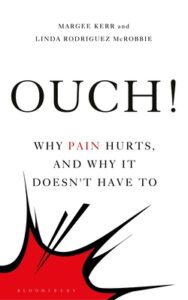 Ouch!: The New Science of Pain, Linda Rodriguez McRobbie, Margee Kerr
Ouch!: The New Science of Pain, Linda Rodriguez McRobbie, Margee Kerr
I’d somewhat feared when I picked this book up that it would be unsympathetic to those with chronic pain, in the way that some doctors are at the moment, because the overprescription of opiates is so much on their minds that everyone reporting pain sounds like a drug seeker to them. There is a bit of commentary on the fact that modern people are more likely to report pain and to be afraid of pain, etc, etc, but overall I found that the two authors were fairly sympathetic and willing to seek out multiple views.
One of the authors has experience with chronic pain and a degenerative illness, and both of them make sure to position themselves so the reader understands where they’re coming from — perhaps too autobiographical for some when it comes to popular science, but I think it was valuable in this case. Either way, both seem to have done a lot of research, including hands-on. Their attitude does lean toward “pain is a good thing and painkillers are generally the wrong treatment”, but doesn’t exclude the usefulness of painkillers for some people. It’s mostly sensitive and sympathetic, as I said, including toward the BDSM community, whose attitudes toward pain they also discuss.
It’s a layperson-friendly guide to what we understand about pain, not just biologically (although it does discuss that) but also psychologically and socially… and it discusses not just physical pain, but to some degree emotional pain as well (particularly as you can’t really have one without the other: human experience isn’t neatly divided like that). It was what I’d hoped for from another book which was much more about responses to pain, so that was nice. Overall, it’s super readable, and I flew through it.
Rating: 4/5
Tags: book reviews, books, non-fiction, science
Posted August 6, 2021 by Nicky in Reviews / 0 Comments
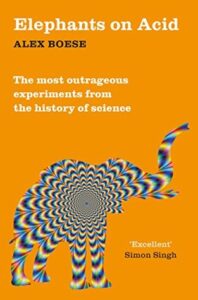 Elephants on Acid, Alex Boese
Elephants on Acid, Alex Boese
I was warned by reviews that Boese covers some abhorrent experiments on animals without any kind of critique, and that’s correct. Boese seems more interested in the shock and amusement factor of some of these experiments, including expecting people to be rather shocked that scientists have tried to study sex in the lab. I actually knew about most of these experiments and findings before, so there was nothing much shocking or surprising for me — except his casual tone about animal experimentation.
(I’m not personally against animal experimentation when necessary, when there’s a possibility of great benefit. I think. It’s a stance that wavers across time, something that I have great difficulty with. What I never change my mind on is unnecessary experimentation: harming animals just to see what happens. Like giving them a massive and deadly overdose of acid, for example.)
It’s a good overview of some “weird” experiments, some of which have produced useful results. Otherwise, meh?
Rating: 2/5
Tags: Alex Boese, book reviews, books, non-fiction, science
Posted August 2, 2021 by Nicky in Reviews / 0 Comments
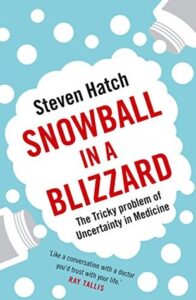 Snowball in a Blizzard, Steve Hatch
Snowball in a Blizzard, Steve Hatch
Snowball in a Blizzard is a great examination of something that goes overlooked far too often — or blown out of proportion in ways that serve weird fringe agendas: the fact that very little in medicine is certain, and it’s not possible to put numbers on many/most things about biology. People forget that when looking for certainty about how to reduce their risk of cancer, or blow it up into something quite different when they want to argue against the importance of vaccines… and it’s really important to understand why there is uncertainty in medicine and what it really means, if you want to make truly informed decisions about your own healthcare. Informing people about this is Steve Hatch’s aim here, and I think he does a great job.
There are one or two points which have suffered a bit in time — for instance, the Rosenhan experiments that he leans on heavily to make a point or two have been discredited, with Susannah Cahalan’s The Great Pretender arguing pretty convincingly that Rosenhan falsified much of the data in his study, which was never run in the way he described. There are also some references to SARS, which are pretty apocalyptic… But broadly speaking, Hatch’s points hold true.
There’s some really fascinating stuff here that I knew very little about. For example, screening mammography — mammograms for people who have not discovered lumps or had any other symptoms of breast cancer — is, on balance, probably harmful for most people. This doesn’t mean that diagnostic mammography is a bad thing, but the indiscriminate screening of everyone in certain groups includes far too many people who are at too low a risk of cancer. Thus, false positives are common, and a lot of mental distress results — and sometimes worse, with people even ending up having unnecessary mastectomies.
Hatch explains the statistics underlying evidence-based medicine really well. I don’t have a good instinctive grasp of statistics, and never have, and this book helped some of these concepts lodge in my brain — which was nice, because I had an exam coming up at that point on exactly some of these types of statistics. I think it would be really useful for anyone who wants to understand better how uncertainty in medicine works and what that might mean for making decisions about your own care.
Rating: 4/5
Tags: book reviews, books, non-fiction, science, Steve Hatch
Posted July 28, 2021 by Nicky in Reviews / 0 Comments
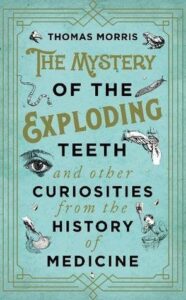 The Mystery of the Exploding Teeth and Other Curiosities from the History of Medicine, Thomas Morris
The Mystery of the Exploding Teeth and Other Curiosities from the History of Medicine, Thomas Morris
The answer to most of the “mysteries”/”curiosities” here is “someone was mistaken or lying”. I was hoping for some weirder tales, to be honest, and some of this is really just “hur hur people swallow weird things sometimes” and “lololol someone put WHAT up their butt?” I was raised by a doctor, none of this is a shock to me, though I’m gonna provoke an internal wince in anyone in my family by just mysteriously leaving one word here: “lightbulbs”. (It’s probably worse than you’re imagining.)
It’s a fun enough light read, though for me it really harped too much on obvious hoaxes, misunderstandings and just the weird things people do that isn’t particularly interesting except that it’s sex-related and idiotic so it’s a reliable source of humour for some people.
Rating: 2/5
Tags: book reviews, books, history, non-fiction, science, Thomas Morris
Posted July 12, 2021 by Nicky in Reviews / 2 Comments
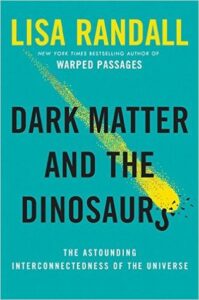 Dark Matter and the Dinosaurs, Lisa Randall
Dark Matter and the Dinosaurs, Lisa Randall
Welp. This book is a lot of dark matter, and not much dinosaurs. Which is more or less what I expected, of course: the title is a really obvious gimmick. And yet, I think I’d have enjoyed it more if it had just been billed honestly. Dark matter itself is fascinating — why do we need to drag the dinosaurs into it?
Well, the author’s contention is that dark matter may explain the alleged periodicity of Earth impacts by meteorites (a theory which I believe is actually in question and has always been a bit of a niche theory — at least in the pop science I’ve read before). She takes a great deal of time explaining the solar system and the formation of the universe, then a bit of time explaining meteorites, then finally gets round to explaining dark matter. By this point, two thirds of the book are done, and she finally introduces her own theory. Finally, in the very last chapter, we finally hear why she’s linking dark matter and dinosaurs.
It’s not badly explained or uninteresting, it’s just very badly titled. I was pretty sure there would not be much by way of dinosaur content, but you do have to live up to this kind of title a bit better than that, to avoid confusion. In the end, it wasn’t quite what I was hoping for — too much time spent on the “this is how the universe came about” which I’ve read eleventy-three different times, and at least twice this very year. Randall doesn’t have the charisma to really carry that off, for me.
Rating: 3/5
Tags: book reviews, books, Lisa Randall, non-fiction, science
Posted July 9, 2021 by Nicky in Reviews / 0 Comments
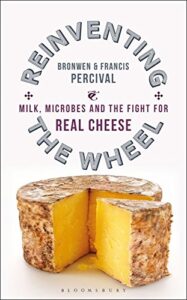 Reinventing the Wheel, Bronwen and Francis Percival
Reinventing the Wheel, Bronwen and Francis Percival
I thought this would be a great companion to The Cheesemonger’s [safdf], though probably more academic and less rich in anecdote. It was probably equally as rich in anecdote, and though the authors’ passion is clear, it somehow didn’t come through nearly as well because other parts of the book felt so dry. It also doesn’t help that they’re very judgemental about what constitutes real cheese, how cheese should be made, how cheese should taste, and yes, also how you should buy and enjoy cheese.
I’m sure the experience they describe as being the only way to eat “proper” “real” cheese is very enjoyable, if expensive and time-consuming; it’s the way they present it as the only way, and as a moral choice, that somewhat bugs me, because it blames consumers and producers for problems introduced by a capitalist system in which profit is more important than most anything else. I’m not sure that if everyone did try to live the way they say cheese should be made, bought and eaten whether that would actually work.
Possibly they’re right, but being judged for enjoying Mexicana Cheese or Applewood or whatever I bought from the supermarket just gets a little wearing.
In any case, it’s a good overview of how pasteurisation and anti-microbial measures have nearly killed the old ways of making cheese, and how that can in many ways be a bad thing. They discuss the fact that the balanced microbial communities in milk that hasn’t been pasteurised — at least in the past — tended to keep each other in balance and avoid some of the spoilage problems that modern cheese is prey to.
Their passion is clear, like I said, but it didn’t make me want to go and eat cheese like Palmer’s book did.
Rating: 3/5
Tags: book reviews, books, non-fiction, science
Posted April 4, 2021 by Nicky in Reviews / 0 Comments
 Science Fictions: Exposing Fraud, Bias, Negligence and Hype in Science, Stuart Ritchie
Science Fictions: Exposing Fraud, Bias, Negligence and Hype in Science, Stuart Ritchie
I’ve been meaning to read this for a while, and happened to pick it up this week — just a week after doing a course on pharmacoepidemiology in the age of COVID, which involved a lot of discussion of how to evaluate papers, and responsible study design. I’m also studying biostatistics and epidemiology this year, of course, meaning that I understand more about statistics than I care to — which means, all in all, that this book slotted in admirably, though quite without meaning it.
The issue the book discusses is a serious one: through the current system of “publish or perish” and the way grants are awarded, tenure is granted, etc, poor science is becoming the way to do things. It’s more important to produce a positive result than to produce a correct one, and even good scientists are lead astray by the rush to publish impressive results from underpowered studies with small sample sizes and implausibly large effects. There are a fair number of innocent mistakes being made, along with the fraud, bias and hype, but it all adds up to a bit of a crisis. As students we’re taught all about how to recognise faulty studies and how to build good ones — but the scientific world we enter into, if we choose research, doesn’t build on those foundations.
The book is surprisingly readable, and I would recommend it to both laypeople and scientists. It offers some very good analyses of what can go wrong, and some suggestions for how we can fix that, move on, and create a better, more open scientific community. It’s possible that if you’re a scientist you’ll wince and recognise that you yourself fell prey to this — the temptation to report positive results and shelve the negative ones, perhaps — but the point isn’t that one should always have been perfect, just that we all have to hold our hands up and work to make things better.
Plus, for a layperson, you’ll gain a better understanding of when to be sceptical, and what the warning signs are.
Rating: 5/5
Tags: book reviews, books, non-fiction, science, Stuart Ritchie
Posted March 29, 2021 by Nicky in Reviews / 1 Comment
 Kindred: Neanderthal Life, Love, Death and Art, Rebecca Wragg Sykes
Kindred: Neanderthal Life, Love, Death and Art, Rebecca Wragg Sykes
That’s a pretty big title, particularly as it includes concepts that people doubt applied to Neanderthals (like love and art). Nonetheless, Wragg Sykes lives up to it, painting a picture of the current state of the art in understanding Neanderthals, their lives, their relationships to each other… and their relationships to us. I lost count of the number of times I just had to share a snippet or an image from this book with my wife, because it’s just so cool what we can know about these people, from the way they ate to their technology level.
One example: their technology level, since we’re speaking of that, was higher than you’d think — for example, they were creating a sort of glue from resin. Pine resin was the best, but other resin when mixed with beeswax gained similar properties, and they knew that and used it! There are multiple levels of technology there, from getting the resin out of the bark (which required a low-oxygen fire) to mixing it to applying it to attaching spearheads to hafts, etc.
I knew some of the things mentioned in this book, of course, particularly when it comes to how Neanderthals are related to us. But much of it was new, or more detailed than I thought, and Wragg Sykes’ interpretation of the evidence is fascinating. Even if you don’t go all the way with her in attributing complex thought and planning to Neanderthals (though I think the evidence tends in her direction), the evidence is astounding enough to keep your attention.
This is actually that rarest of things: a popular science book which I will keep, even though I probably won’t read it again, because I enjoyed it so much and I would like to have it to hand to refer to in the future.
Rating: 5/5
Tags: book reviews, books, history, non-fiction, Rebecca Wragg Sykes, science
Posted February 28, 2021 by Nicky in Reviews / 0 Comments
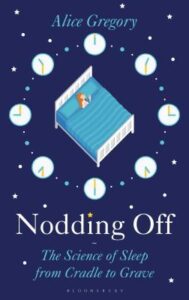 Nodding Off: The Science of Sleep, Alice Gregory
Nodding Off: The Science of Sleep, Alice Gregory
This book is about the importance of sleep: the functions it fulfils for us, how that changes throughout our life cycles, and the consequences of not getting enough. It has a wealth of citations, and most of it was unsurprising to me, suggesting it’s a reasonable synthesis of the current state of our knowledge.
However, and this is a really big but, I lost count of how many times Gregory proclaims something and then admits in the next sentence or a footnote that it was a ‘small study’ and hadn’t been replicated in other studies, especially when she says it hasn’t been replicated in larger studies. The fact that she made it sound like these things were facts, when actually it was that shaky, gave me pause about more or less everything she said.
You can’t make big claims from small, underpowered studies. That’s just not how it works. They can be a testing ground, a starting point, but there’s no way you should be presenting them as fact in a pop-science book where people might actually think these are tried and tested facts, even if you explain the study is small. People just don’t grasp the significance of that (or rather, the fact that it’s probably not significant!).
I’ve also definitely had more engaging pop-science reads lately; Sue Armstrong comes to mind. Sleep can be a fascinating topic, but I found myself nodding off over Nodding Off.
Rating: 2/5
Tags: Alice Gregory, book reviews, books, non-fiction, science
 Braiding Sweetgrass: Indigenous Wisdom, Scientific Knowledge, and the Teachings of Plants, Robin Wall Kimmerer
Braiding Sweetgrass: Indigenous Wisdom, Scientific Knowledge, and the Teachings of Plants, Robin Wall Kimmerer








